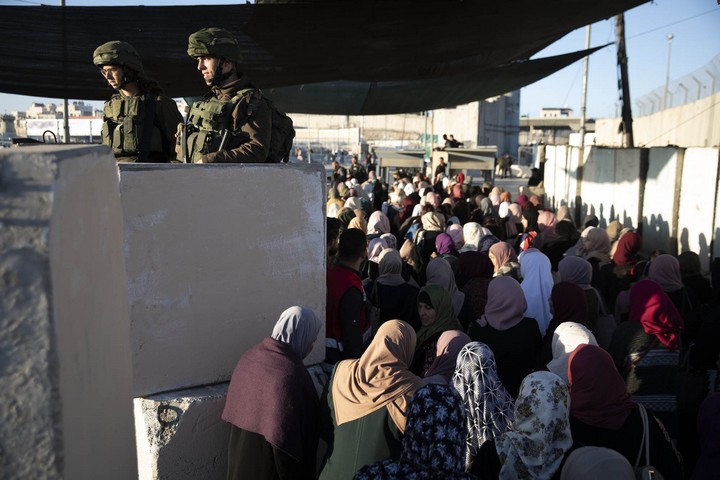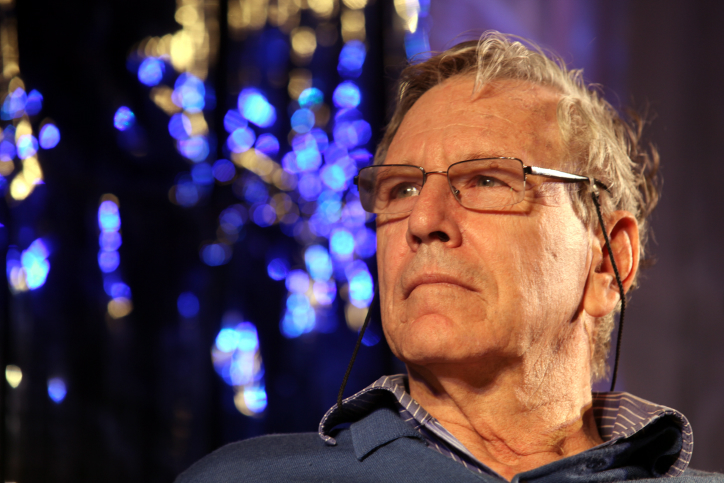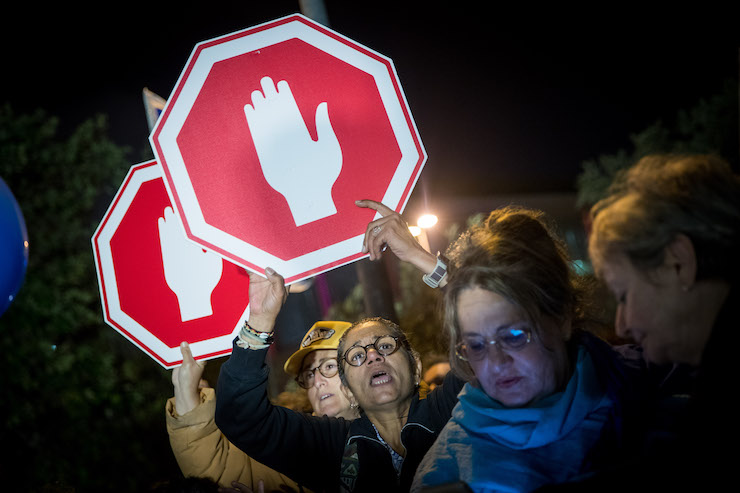It is our duty to take every opportunity to say to the world that the occupation is not Israel, that we are not willing to continue imposing military rule on another people any longer.
By Zehava Galon

In Israel of 2019, the controversy is no longer over one state, two states, democracy or apartheid. Today, the very legitimacy of discussing alternatives to Israel’s current political trajectory is beyond the pale. Politicians of the old, new or extreme right are no longer interested in dealing with alternatives but rather in delegitimizing anyone who opposes their policies. Meanwhile, Prime Minister Benjamin Netanyahu divides the Israeli public into “loyalists” and “traitors” rather than to supporters and opponents of the occupation.
Disputes are the lifeblood of democracy, but Netanyahu’s successive governments have changed the rules. Until recently, it was still possible to hold on to the illusion that we all share a democratic set of values. We believed that the rule of law exists, that everyone is equal before the law, and that there is loyalty to certain state rules. Netanyahu’s government has dissolved all that, de facto changing Israel’s regime from a liberal democracy to one that de-legitimizes those who oppose it and that despises human rights and democratic norms.
Critics of the occupation are routinely and publicly condemned. Just look at what happened to prominent television journalist Oshrat Kotler when during a news broadcast on Channel 13, she said: “We send children to the army, to the territories, and they return animals. That is the result of the occupation.” Netanyahu responded by saying: “I am proud of the IDF soldiers and I love them very much. Oshrat Kotler’s remarks deserve every condemnation.” His peers on the right demanded the attorney general bring her to justice.
When B’Tselem Executive Director Hagai El-Ad told the UN Security Council that the world must “act against the ongoing oppression of the Palestinian people,” Israelis responded by wondering why El-Ad would speak about these matters abroad. This question is repeatedly directed at peace and human rights organizations, who understand that preaching on moral grounds alone is not enough to make Israel realize the cruelties of its policies and will certainly not end the oppression all at once. Netanyahu’s government limits the ability of those civil society organizations to enter public institutions, schools and pre-military preparatory programs.
In a letter he sent to B’Tselem in 2016, the late author Amos Oz explained his decision not to take part in events held in his honor abroad: “The increasing radicalization of the government’s policies, together with its clear intentions to continue controlling the territories while dispossessing the Palestinian residents, has led me to decide not to participate in such events held at Israeli embassies all over the world. It is a painful decision. The continued oppression and theft of land in the territories, the incitement against anyone who disagrees with government policies and the legislative initiatives aimed at restricting freedom of expression and the status of the court, have led me to this decision.”

It was Netanyahu himself who set off the incitement against El-Ad when he said that “while our soldiers are preparing for the defense of Israel’s security, the executive director of B’Tselem chooses to make a speech full of lies at the UN in an attempt to help the enemies of Israel.”
In order to consolidate this division of “loyalists” and “traitors,” Netanyahu cannot make do solely with the oppression of the Palestinian people and the persecution of civil society organizations. His project also requires the crushing of all critical voices in Israeli society. It requires hollowing out the Supreme Court while weakening the gatekeepers, the media, academia the cultural institutions. It requires tarnishing law books with anti-democratic bills. It means ramping up the struggle against delegitimization and BDS by various state entities such as the Foreign Ministry, the army, the Prime Minister’s Office, the Ministry of Strategic Affairs, and the Shin Bet.
The prime minister is building his political capital by inciting against an entire political camp made up of individuals of who have devoted their lives to reforming this country. In order to do so, he has found the perfect scapegoat: the very act of talking about the occupation, criticizing and reminding the public about the injustices of the past. It is time for an alternative policy as an act of resistance from within. It is essential for changing Israel’s character and for protecting its democracy. This is what should unite the parliamentary opposition.

It is our duty to criticize the alliances that the Israeli government is forming with dark and despicable regimes, and the pursuit of every dubious, murderous anti-Semite and racist tyrant who is ready to move an embassy to Jerusalem. It is our duty to act against the government’s policy, aided by various legal bodies in the State Prosecutor’s Office, the military law enforcement system, and even the High Court of Justice, in order to undermine the obligation to comply with international law.
It is our duty to oppose the incitement of government ministers against Israel’s most important partners and allies, such as the European Union, only because they oppose the occupation and because they are committed to international law and human rights. It is our duty to continue speaking abroad and take every opportunity to say that the occupation is not Israel, that we are not willing to continue imposing military rule on another people any longer.
Israel does not have to be a discriminatory apartheid state that classifies people as “loyal” occupation supporters or “traitorous leftists.” Israel can really be a normal, liberal and open democracy.
Zehava Galon is a former Meretz chairperson and former Israeli Member of Knesset. This article is based on a speech she delivered at a conference of Mitvim – The Israeli Institute for Regional Foreign Policies on alternative directions to Israel’s foreign policy.
